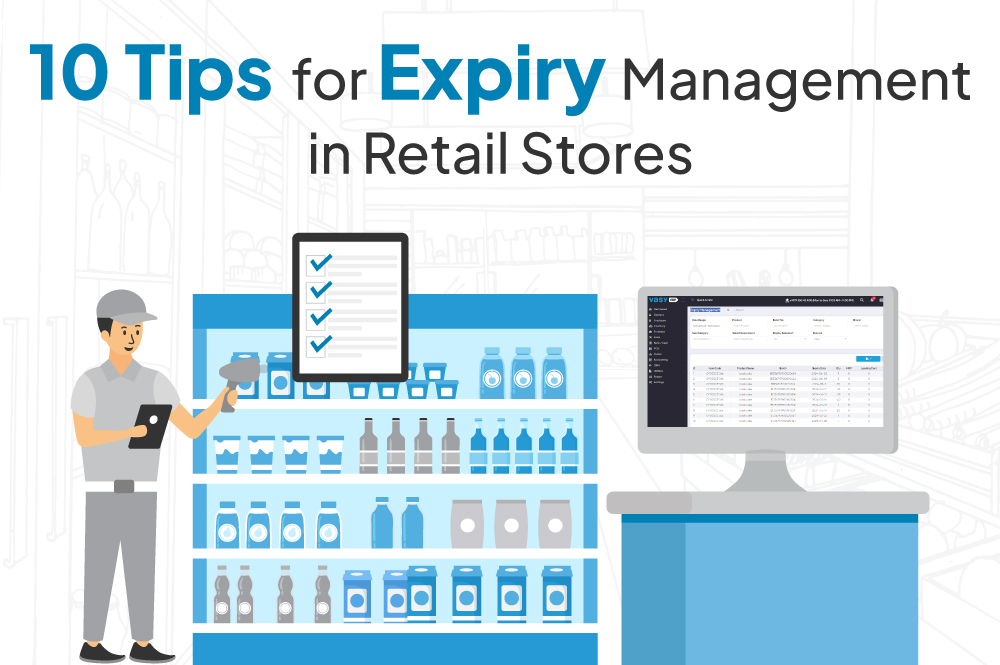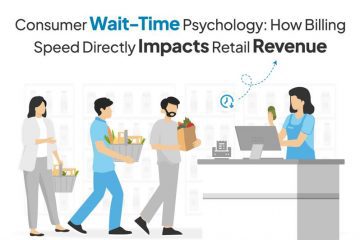10 Tips for Expiry Management in Retail Stores
June 11, 2024

Managing expiry and shelf life is one of the biggest pain points in retail businesses like grocery stores, supermarkets, convenience stores, milk dairies, bakery shops, cake shops, pet food stores, fruits and vegetables stores, etc. Without proper expiry management, retailers can face huge losses due to unsold expired goods or even face far worse consequences if they sell any expired product by mistake.
This is where expiry management in retail stores comes into play. With adequate knowledge, strategies, techniques, and the use of expiry management technologies, retailers can easily address expiry management challenges.
Consider this guide as your secret weapon for mastering expiry management. We will discuss what expiry management is, why is it important for retailers, and how to ensure your retail store can handle product expiry like a Pro.
Within retail store operations, expiry management is the process of tracking, monitoring, and managing the expiration dates of perishable goods. This focuses on developing strategies and tools to ensure products are sold long before their ‘expiry’ or ‘best-before’ dates. Expiry management is also aimed at ensuring that customers receive safe-to-consume items.
A properly designed expiry management process has great benefits:
Retailers cannot sell the expired goods. If they do, there can be damaging consequences to the retailer’s reputation, legal repercussions from the authorities, and even customers can file a case against the retailer.
The above incident involving Gajender Yadav, a Delhi resident, who ordered a 10 kg packet of wheat flour from Zepto, only to discover that it had a rapidly approaching expiration date of just eight days, underscores the critical importance of expiry management in retail stores. Zepto had to face a lot of embarrassment due to the above expiry-related incident.
| Legal Penalties Fines and legal action from regulatory bodies like the Food Safety and Standards Authority of India (FSSAI). | Loss of Customer Trust If you sell expired items to customers, they won’t come back to buy from you and you will lose lifetime revenue | Health Risks Potential health hazards to consumers can result in lawsuits and compensation claims. |
| Regulatory Scrutiny Once your name pops up in selling expired items you will face Increased scrutiny and inspections from regulatory authorities. | Negative Reviews Be ready to face negative publicity on all review platforms from customers about your retail stores | Loss of Business You will have to cope with severe business loss or even license cancellation scenarios |
Retailers can face serious consequences in cases of non-compliance with expiry-related laws in India which have now extended to online retailers too. Also, before we go to this extent, there are financial losses at the retailers’ end.
Retailers who are ethical and don’t sell expired products will be saved from the wrath of the authorities or customers, but still, they will be left with waste products. These waste products are direct losses to the retailers. Retailers can face huge troubles or losses without an expiry management mechanism and product expiry tracking process.
With consumer laws getting stricter and consumers taking everything to social media, retailers need expiry management more than ever before.
Let us understand how retailers can manage it:

The first step to conquering expiry dates is understanding factors that affect the shelf life of each product. Shelf life refers to the period during which a product remains safe and maintains its desired quality. Most products come with a clearly marked expiration date set by the manufacturer.
Shelf life also depends on storage conditions, so factor that in.
For instance, a dairy product might have a longer shelf life when refrigerated. Retailers should note the expiry conditions and ensure that products are stored so as to retain their freshness and usability.
Once you know your shelf life, implement the FIFO (First-In, First-Out) method. This means ensuring the products that arrived at your store first are sold or used.
Here’s how:
Physical Organization: During stocking, place newer items behind older ones, ensuring older products are displayed and sold first.
Labelling Love: Consider adding a “received on” date alongside the expiry date on your products for better organization.
FIFO is an inventory management technique that can be practiced by regular stock rotation. Stock rotation is the physical process of moving old products to the front of the shelves and putting new ones on the back. Set specific times each week or month to rotate your inventory, and make sure older items can sell out quickly. Assign stock rotation tasks to specific employees and make sure everyone understands the FIFO principle.
Gone are the days of relying on memory alone. Retail management software like VasyERP has an inbuilt expiry management module.
Expiry Alerts: Set automatic alerts to notify you when products are nearing expiry. This allows you to take timely action, like promoting near-expiry items or strategically placing them for quicker sales.
Sales Prevention: VasyERP’s POS system can be configured to prevent accidental sales of expired products, saving you from potential customer dissatisfaction and legal issues.
Better organized suppliers can significantly improve your expiry management. The suppliers who manage expiry at their own end are the best to collaborate with for your inventory needs.
Here’s how to work together:
Negotiate Delivery Schedules: Discuss receiving smaller, more frequent deliveries of perishable items to reduce the risk of spoilage.
Transparency is Key: Communicate your estimated sales volume to suppliers to help them plan deliveries that meet your demand and minimize the risk of overstocking near-expiry items.
Choose suppliers with optimal logistics: Suppliers that have better delivery mechanisms will ensure that unnecessary delays do not shorten the expiry timeline.
| “Travel time between various channels — from the manufacturing plant to the warehouse has to reduce so consumers get fresh products.” –Devendra Chawala of Big Bazaar In an interview given to Brandequity (Economic Times) |
Your sales data holds valuable insights for expiry management. Regularly analyze your sales trends to:
Monitor sales: Check your sales log for slow-selling items. This will help you order fewer items so they don’t expire before you can sell them.
Consider the seasons: If you sell lemons, for example, you probably sell more in the summer than in the winter. So, order more lemon in the summer and less in the winter.
VasyERP comes with features that provide MIS reports on best and least-selling items, trends in your inventory, and expiry reports.
Strategic product placement can significantly impact sales and expiry management:
Golden Shelf Space: Place near-expiry items at eye level or high-traffic areas to encourage customers to pick them up. Placing near-expiry items at eye level ensures they are one of the first things customers see when scanning the shelves.
High-foot Traffic Areas: Positioning near-expiry items in areas that receive high foot traffic, such as near the entrance, checkout lanes, or end-of-aisle displays, increases the likelihood of impulse purchases.
A well-informed team is crucial for successful expiry management. Train your staff on:
Expiry Date Identification: Ensure everyone can clearly identify and understand expiry dates.
Stock Rotation Techniques: Train staff on proper stock rotation procedures to maintain FIFO order.
Reporting Process: Encourage staff to inform managers about any damaged or near-expiry products they encounter during stocking or sales.
Stock-aging reports: Let the staff access the stock-aging report that tells about the expiry parameters.
When products expire, it can greatly affect a retailer’s business, leading to unsold inventory and wasted resources. To effectively manage this, it’s crucial to keep track of when products are likely to go unsold due to reasons like expiration. VasyERP offers a helpful tool known as “material consumption” within the inventory section to assist retailers in managing these challenges efficiently.
Create a New Record: Click on “create new” to begin documenting the consumption.
1. Date: Select the date of the consumption.
2. User: Choose the user handling the consumption.
3. Consumption Type: There are 6 Consumption Type options given, select the appropriate type from the following options: Expiry, Production, Scrap or Wastage, Sample, Damage, Leakage
(Expiry: For products that have surpassed their expiration date and cannot be sold)
4. Add Remarks: If there are any specific details or notes to add, use the provided box to record them.
5. Save: By clicking the save button, the information is recorded, and the stock is automatically adjusted to reflect this usage.
Warehouse optimization plays a crucial role in expiry management in retail stores by ensuring efficient inventory control and reducing waste. Through advanced tracking systems and data analytics, warehouse optimization allows for precise monitoring of product lifecycles. This ensures that items nearing their expiration dates are prioritized for dispatch to retail outlets, minimizing the risk of selling expired goods and thus safeguarding consumer health.
Label and track the product’s expiration dates, and prioritize dispatch of near-expiry items from the warehouse. Generate barcode labels from VasyERP’s label and barcode generator.
Create special promotions or discounts for near-expiry items to clear them out quickly. Offer significant discounts (e.g., 50% off) on near-expiry items for a limited time. Create bundled offers where customers can purchase multiple near-expiry items at a reduced price. Offer extra loyalty points or rewards for purchasing near-expiry items. Provide discount coupons specifically for near-expiry items.
Remember, you don’t have to fight the expiry battle alone. VasyERP’s integrated inventory management system empowers you with:
VasyERP makes it easy to keep track of your store’s inventory. It can record important details about your products, like batch numbers, when they were made, and when they expire. This feature is great for retailers because it helps you to know which items to sell first so nothing goes to waste. This way, you can make sure your customers always get fresh products and your store stays efficient.
By implementing VasyERP’s powerful features, you can transform your store into an expiry management champion. Reduce waste, maximize profits, and ensure your customers always have access to fresh, high-quality products.
Ensuring items sell before they spoil, and maintaining proper stock rotation can feel like a Happy day. Well-managed expiry and shelf life processes are integral to operational efficiency, economic sustainability, and brand integrity in the retail store business. Following the tips discussed in the article, you’ll be a master of managing expiry dates in no time!
VasyERP can also help with automated alerts, smart sales prevention, and real-time inventory tracking. VasyERP’s Expiry and Shelf Life Management module helps address all of your expiry & shelf life management-related issues. Schedule a free demo to learn how to use VasyERP for expiry and shelf life management.

Imagine opening your retail store, only to find your st...
November 29, 2023

This blog discusses how billing speed in retail influe...
December 18, 2025
